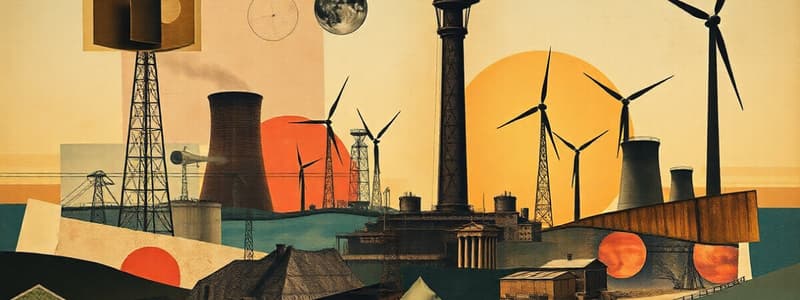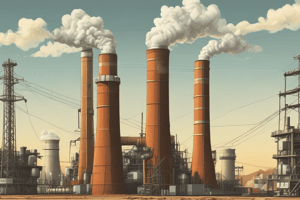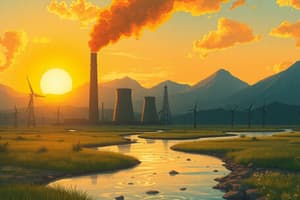Podcast
Questions and Answers
What are the three main types of fossil fuels?
What are the three main types of fossil fuels?
- Coal, oil, and natural gas (correct)
- Coal, solar, and wind energy
- Wood, gasoline, and ethanol
- Biodiesel, charcoal, and kerosene
What is the primary origin of coal?
What is the primary origin of coal?
- Ancient animal remains
- Swamps and bogs filled with dead trees and plants (correct)
- Volcanic ash deposits
- Ocean sediments from aquatic organisms
How does high pressure transform organic matter into fossil fuels?
How does high pressure transform organic matter into fossil fuels?
- It evaporates water to enhance combustion efficiency
- It helps in the radiation decay of isotopes
- It alters the chemical structure and forms hydrocarbons (correct)
- It decomposes the matter into minerals
Why are fossil fuels considered necessary in daily life?
Why are fossil fuels considered necessary in daily life?
What is peat, in the context of coal formation?
What is peat, in the context of coal formation?
What happens to organic matter as it becomes buried under sedimentary rock?
What happens to organic matter as it becomes buried under sedimentary rock?
Which statement accurately reflects the timeline of fossil fuel formation?
Which statement accurately reflects the timeline of fossil fuel formation?
What is one of the key components of fossil fuels?
What is one of the key components of fossil fuels?
What is the primary process through which plants convert sunlight into energy?
What is the primary process through which plants convert sunlight into energy?
What allows fossil fuels to contain concentrated energy?
What allows fossil fuels to contain concentrated energy?
Which fossil fuel is associated with particularly high levels of pollution?
Which fossil fuel is associated with particularly high levels of pollution?
Which statement represents a disadvantage of using fossil fuels?
Which statement represents a disadvantage of using fossil fuels?
What is one of the major advantages of using fossil fuels?
What is one of the major advantages of using fossil fuels?
How does the extraction process of fossil fuels pose a risk to the environment?
How does the extraction process of fossil fuels pose a risk to the environment?
What is one of the main contributors to global climate change related to fossil fuel usage?
What is one of the main contributors to global climate change related to fossil fuel usage?
Which of the following fossil fuels is primarily used for heating and cooking in homes?
Which of the following fossil fuels is primarily used for heating and cooking in homes?
What is acid rain primarily a result of when discussing fossil fuel usage?
What is acid rain primarily a result of when discussing fossil fuel usage?
Which of the following statements is true regarding the formation of fossil fuels?
Which of the following statements is true regarding the formation of fossil fuels?
Flashcards
Fossil Fuels
Fossil Fuels
Substances formed from the remains of ancient plants and animals buried millions of years ago, subjected to heat and pressure.
Types of Fossil Fuels
Types of Fossil Fuels
The three main types of fossil fuels are coal, oil (crude oil or petroleum), and natural gas.
Fossil Fuel Formation
Fossil Fuel Formation
Fossil fuels are created over millions of years from the remains of ancient organisms, transformed by heat and pressure deep underground.
Oil and Natural Gas Formation
Oil and Natural Gas Formation
Signup and view all the flashcards
Coal Formation
Coal Formation
Signup and view all the flashcards
Fossil Fuel Uses
Fossil Fuel Uses
Signup and view all the flashcards
Peat
Peat
Signup and view all the flashcards
Peat to Coal Transformation
Peat to Coal Transformation
Signup and view all the flashcards
Photosynthesis
Photosynthesis
Signup and view all the flashcards
Coal
Coal
Signup and view all the flashcards
Oil
Oil
Signup and view all the flashcards
Natural Gas
Natural Gas
Signup and view all the flashcards
Global Climate Change
Global Climate Change
Signup and view all the flashcards
Acid Rain
Acid Rain
Signup and view all the flashcards
Nonrenewable Resources
Nonrenewable Resources
Signup and view all the flashcards
Renewable Resources
Renewable Resources
Signup and view all the flashcards
Fossil Fuel Extraction
Fossil Fuel Extraction
Signup and view all the flashcards
Study Notes
Fossil Fuels: Formation, Uses, and Impacts
- Fossil fuels are crucial energy sources, including coal, oil, and natural gas.
- They originated millions of years ago from preserved plant and animal matter.
- Fossil fuels are non-renewable resources, meaning they take millions of years to form.
Fossil Fuel Creation
- Remains of marine life (plants and animals) sank to the ocean floor, accumulating over time.
- Layers of sand, rock, and mud formed over them, gradually turning into sedimentary rock.
- Intense pressure and heat over geologic time transformed the buried organic matter into fossil fuels.
- Coal formation primarily involves dead plant matter (trees, etc.) in swamps.
- These materials were compressed under layers of sediment and transformed into coal over time.
Fossil Fuels as Energy Sources
- Photosynthesis in plants converts sunlight into energy stored in plant matter.
- This energy is passed on to consumers (animals) that eat the plants.
- The buried plant and animal remains were largely preserved from decay, locking in energy.
- High pressure and heat compact the organic matter, concentrating its energy.
- This results in the concentrated energy stored within fossil fuels.
Advantages of Fossil Fuels
- Fossil fuels are abundant and relatively inexpensive.
- Provide significant energy concentrated in a relatively small space.
- Easily transportable, especially oil via pipelines.
- Natural gas is a clean-burning fuel with high efficiency, used for heating, cooking, etc.
- North America is a major producer of natural gas, improving energy independence.
Disadvantages of Fossil Fuels
- Burning fossil fuels produces significant carbon dioxide emissions contributing to climate change.
- Coal mining is dangerous, and coal combustion leads to significant air pollution, including acid rain.
- Oil spills during transport can damage marine environments.
- Non-renewable nature necessitates a shift toward renewable energy alternatives.
Lesson Summary
- Fossil fuels are formed from ancient plant and animal life.
- Key characteristics of the three forms of fossil fuels are described: Coal, oil, and natural gas.
- Benefits of fossil fuel use are summarized, including energy abundance, transport, and economical value.
- Negative consequences of using fossil fuels are highlighted, such as pollution, climate change, and environmental damage.
Studying That Suits You
Use AI to generate personalized quizzes and flashcards to suit your learning preferences.





